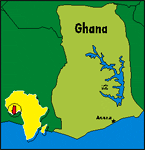|
|

Ghana, nestled in Africa’s western region where the continent
bulges against the ocean, does not have a peaceful history.
 More than 2,000 people died in what Ghanians call “the 1994 Conflict.”
That clash, among the nation’s northern people, was about land,
said Edward Adimazoya, Catholic Relief Services program officer
in Ghana. He supervises the Northern Ghana Peace Building and
Transformation Project (commonly called the “Peace Project”). More than 2,000 people died in what Ghanians call “the 1994 Conflict.”
That clash, among the nation’s northern people, was about land,
said Edward Adimazoya, Catholic Relief Services program officer
in Ghana. He supervises the Northern Ghana Peace Building and
Transformation Project (commonly called the “Peace Project”).
All tribal groups have a chief, he
explained, but the chief is not necessarily a king. Kings control
access to land, granting farmers permission to use the land. A
family does not know year-to-year whether they will be allowed
to stay.
While the system of tribal kings controlling the land remains
the same, following the 1994 clash Ghanians agreed there needed
to be a better way to resolve such disagreements.
Today, the Peace Project supports conflict resolution training.
Development workers, students, parliament members, tribal chiefs
and villagers interested in building peace in the area have all
participated in CRS workshops.
“The Peace Project is challenging because it can’t be measured
like other projects. We can only measure the effect through responses
and reactions,” Adimazoya said.
People in Attributu, a village of fewer than 2,000 people, have
seen the benefits of the Peace Project.
“It is a great help to us especially during the political time,”
Yaku Bu Casoto said referring to last December’s presidential
elections. “I learned that someone supporting a different political
party doesn’t mean they are opposed to me personally.”
The program benefits people outside election time as well.
“I have some experiences with this,” Ajara Saaka said as she stood
up and put her hand on her hip. “There was a woman who would go
to the water well with many containers and fill them all without
allowing others to take a turn.” Since conflict resolution training,
Saaka met with other women and created a rule that each person
could fill one container at a time and then let the others in
line have a turn.
Saaka says she used to avoid conflicts, but now wants to intervene
when she sees a problem. Do people get angry with her for trying
to intervene? “Oh, yes,” Saaka said. “It’s never easy.”
Adimazoya explained successes of the project that a visitor might
not realize. “Normally in the villages, the women do not speak
at meetings,” he said. “They often do not know enough about the
topics, so their husbands speak for them.” The women in this village
speak their minds and the men support them.
Moruguwura Yakubu, village chief for 25 years, says he is proud
of the people. “I’m very happy about the Peace Project. Because
of the training, our problems have not grown serious. That doesn’t
mean problems don’t exist. They do, but we solve them between
myself and my people.”
—Chris Spoons
Related story: The lab that St. Sabina built
Front Page | Digest | Cardinal | Interview
Classifieds | About Us | Write Us | Subscribe | Advertise
Archive | Catholic Sites | New World Publications | Católico | Directory | Site Map
|






